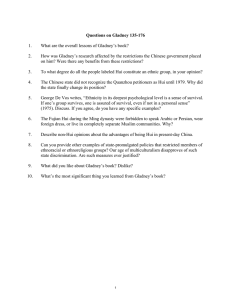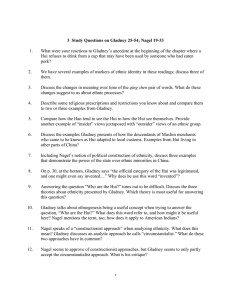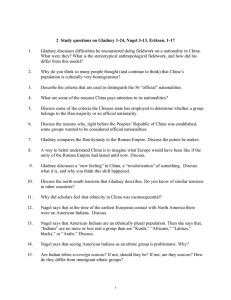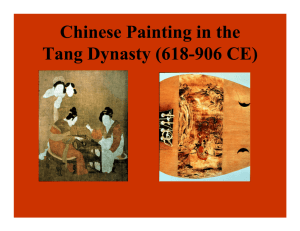1. List all of the reasons you can think of why... and religious practices.
advertisement
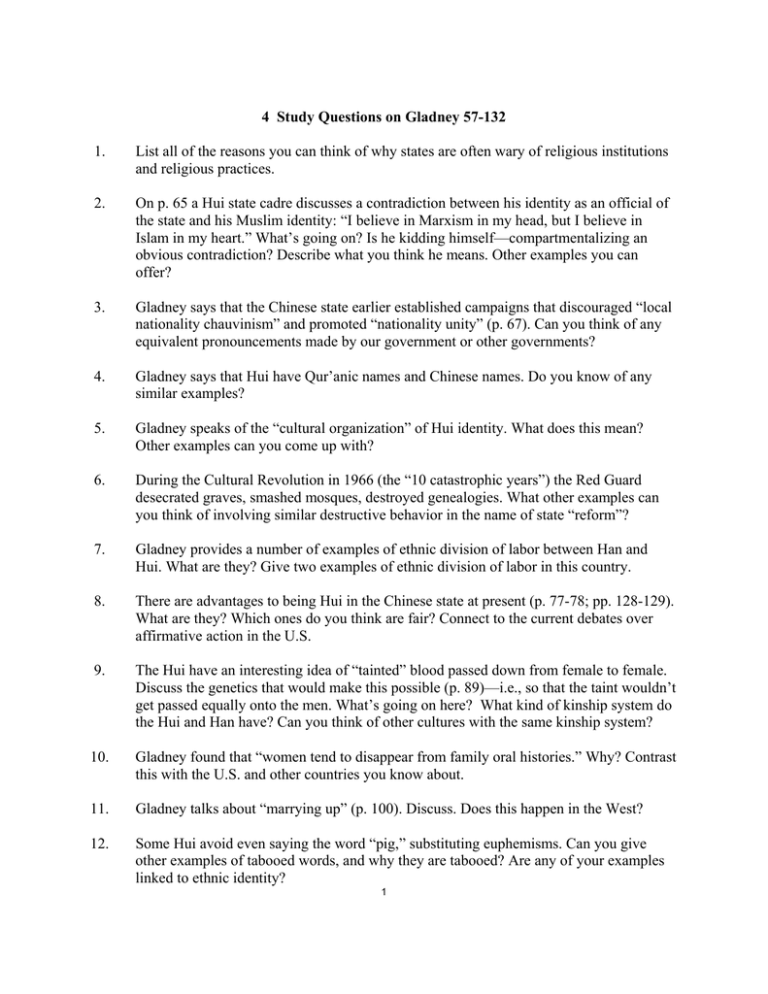
4 Study Questions on Gladney 57-132 1. List all of the reasons you can think of why states are often wary of religious institutions and religious practices. 2. On p. 65 a Hui state cadre discusses a contradiction between his identity as an official of the state and his Muslim identity: “I believe in Marxism in my head, but I believe in Islam in my heart.” What’s going on? Is he kidding himself—compartmentalizing an obvious contradiction? Describe what you think he means. Other examples you can offer? 3. Gladney says that the Chinese state earlier established campaigns that discouraged “local nationality chauvinism” and promoted “nationality unity” (p. 67). Can you think of any equivalent pronouncements made by our government or other governments? 4. Gladney says that Hui have Qur’anic names and Chinese names. Do you know of any similar examples? 5. Gladney speaks of the “cultural organization” of Hui identity. What does this mean? Other examples can you come up with? 6. During the Cultural Revolution in 1966 (the “10 catastrophic years”) the Red Guard desecrated graves, smashed mosques, destroyed genealogies. What other examples can you think of involving similar destructive behavior in the name of state “reform”? 7. Gladney provides a number of examples of ethnic division of labor between Han and Hui. What are they? Give two examples of ethnic division of labor in this country. 8. There are advantages to being Hui in the Chinese state at present (p. 77-78; pp. 128-129). What are they? Which ones do you think are fair? Connect to the current debates over affirmative action in the U.S. 9. The Hui have an interesting idea of “tainted” blood passed down from female to female. Discuss the genetics that would make this possible (p. 89)—i.e., so that the taint wouldn’t get passed equally onto the men. What’s going on here? What kind of kinship system do the Hui and Han have? Can you think of other cultures with the same kinship system? 10. Gladney found that “women tend to disappear from family oral histories.” Why? Contrast this with the U.S. and other countries you know about. 11. Gladney talks about “marrying up” (p. 100). Discuss. Does this happen in the West? 12. Some Hui avoid even saying the word “pig,” substituting euphemisms. Can you give other examples of tabooed words, and why they are tabooed? Are any of your examples linked to ethnic identity? 1 2 13. Gladney says that for the urban Hui, ethnoreligious identity is often authenticated and judged by one’s qing zhen lifestyle (p. 132). Give two examples of similar criteria for claiming and maintaining ethnic identity in the U.S., or another country you know. 14. Some Han resent certain advantages the state has provided the Hui (for example, on pp. 76-77). Discuss. 15. Why has the state reversed its previous stance toward ethnoreligious identity and practice, at least in the case of the Hui? 16. Describe tongyangxi (minor) marriage (p. 92). What do you think of this practice? Why, do you think, does it exist? Do you think these marriages are likely to be more successful, or less successful than conventional marriages? 2 MIT OpenCourseWare http://ocw.mit.edu 21A.226 Ethnic and National Identity Fall 2011 For information about citing these materials or our Terms of Use, visit: http://ocw.mit.edu/terms.
